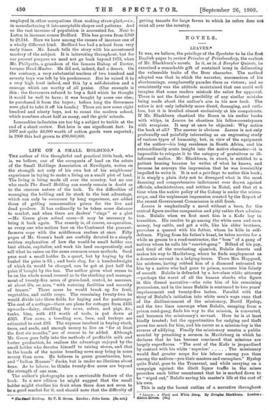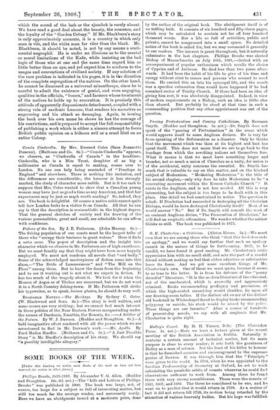NOVELS.
LEAVEN.*
IT was, we believe, the privilege of the Spectator to be the first English paper to review Prinsloo of Prinsloosdoip, the earliest of Mr. Blackburn's novels. In it, as in A Burgher Quixote, he exercised a remarkable gift of sustained irony in delineating the vulnerable traits of the Boer character. The method adopted was that in which the narrator, unconscious of his shortcomings, complacently parades them as virtues; and so consistently was the attitude maintained that one could well imagine that some readers mistook the satire for approval. There is not the faintest possibility of any similar mistake being made about the author's aim in his new book. The satire is not only infinitely more direct, damaging, and ruth- less, but it is levelled almost exclusively at his compatriots. If Mr. Blackburn chastised the Boers in his earlier books with whips, in Leaven he chastises his fellow-countrymen with scorpions. It may at once be objected: Why notice the book at all P The answer is obvious. Leaven is not only profoundly and painfully interesting as an engrossing study of various types of humanity, but, in view of the equipment. of the author—his long residence in South Africa, and his extraordinarily acute insight into the native character—it is. impossible to relegate it to the category of gratuitous or ill- informed malice. Mr. Blackburn, in short, is entitled to a. patient hearing because he writes of what he knows, and because be conveys the impression that he was irresistibly impelled to write it. It is not a privilege to notice this book; it is simply a plain duty not to disregard what is the most. damning and comprehensive indictment ever drawn against officials, administrators, and settlers in Natal, and that at a. time when the native policy of the Colony is under the micro- scope, and the unpleasant impression created by the Report of the recent Government Commission is still fresh.
Leaven is emphatically a novel without a hero, for the central figure excites compassion and pity rather than admira- tion. Bulalie when we first meet him is a Kafir boy in transition. His resolve to go among the white men and earn money, buy cattle, and get a wife, like his elder brothers,_ provokes a quarrel with his father, whom be kills in self-- defence. Flying from his father's kraal, be takes service for a. while as groom to a road-contractor, the " boss " of a gang of- natives whom he calls his " convict-gang." Bilked of his pay,. and tired of the everlasting sjambok, Bulalie deserts and makes his way to Maritzburg, where he finds employment as- a domestic servant in a lodging.house. There Mrs. Hopgood, his mistress, having robbed him of a diamond entrusted to- him by a native who had gone to prison, accuses him falsely of assault. Bulalie is defended by a low-class white attorney- -perhaps the worst of all the human sharks who figure. in this dismal narrative—who robs him of his remaining possessions, and in the issue Bulalie is sentenced to two years' imprisonment and twenty-five lashes. Parallel with the story of Bulalie's initiation into white men's ways runs that of the disillusionment of the missionary, David Hyslop, and the two lines converge when Bulalie, escaping from a prison road-gang, finds his way to the mission, is converted, and becomes the missionary's servant. Here he is at least-
kindly treated ; but the opportunities for cadging and theft prove too much for him, and his career as a mission-boy is the
reverse of edifying. Finally the missionary creates a public scandal by preaching a sermon in Maritzburg in which he declares that he has become convinced that missions are largely superfluous. " The soul of the Kafir is jeopardised by contact with his white superior.' The missionary - would find greater scope for his labour among you than . among the natives—you their masters and exemplars." Hyslop quits Natal, goes to the Transvaal, and while carrying on a . campaign against the illicit liquor traffic in the mines . provokes such bitter resentment that he is marked down to be " wiped out," Bulalie saving his master's life at the cost of"' his own.
This is only the barest outline of a narrative throughout .
• Leaven : a Black and White Story. By Donglae Blackburn, London s Alaten Rivera. Cam] ♦ which the sound of the lash or the ajambok is rarely absent. We have read a good deal about the beauty, the romance, and the loyalty of the " Garden Colony." If Mr. Blackburn's story Is only approximately accurate, it is a country in which only -man is vile, and the white man far viler than the black. Mr. Blackburn, it should be noted, is not by any means a senti- -mental negrophil. He is under no illusions as to the mental -or moral limitations of the Kafir, while insisting on the bad logic of those who at one and the same time regard him as little better than an ape, and yet expect him to conform to the -usages and conventions of civilised society. If any solution of the race problem is indicated in his pages, it is in the direction -of the complete segregation of the natives. On the other hand, he cannot be dismissed as a universal misanthrope, since he is -careful to admit the existence of genial, and even engaging, qualities in the officials, " bosses," and farmers whose treatment -of the natives he holds up to execration. It is precisely this Attitude of apparently dispassionate detachment, coupled with a strong vein of sardonic humour, that renders his narrative so engrossing and his attack so damaging. Again, in issuing the book over his own name he shows he has the courage of his convictions, and is prepared to accept the full responsibility of publishing a work which is either a sincere attempt to focus . British public opinion on a hideous evil or a cruel libel on an entire Colony.











































 Previous page
Previous page